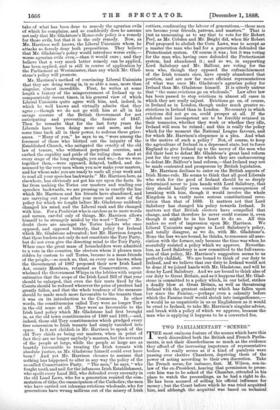MR. HARRISON'S DELIVERANCE.
THERE will be great gratulations in the Liberal camp over Mr. Frederic Harrison's very eloquent invective against the Liberal Unionists in the new number of the Contemporary Review. We say very eloquent, for no one could speak out more completely from the heart than Mr. Harrison ; but to satisfy our notion of eloquence, something more is requisite than even invective of this truly cordial character,—namely, more regard to principle, more eye upon the facts. Except for his references to Mr. Shaw-Lefevre's not always Very accurate history of the recent "Incidents of the Campaign," Mr. Harrison's article might almost have been composed six years ago, so little notice does it take of what has been done to remedy the agrarian evils of which he complains, and so confidently does he assume not only that Mr. Gladstone's Home-rule policy is a remedy for those evils, but that it is the only remedy. Now, as Mr. Harrison well knows, the Liberal Unionists whom he attacks so fiercely deny both propositions. They believe' that Mr. Gladstone's policy would introduce worse evils,— worse agrarian evils even,—than it would cure and they believe that a very much better remedy can be applied, has been applied, and is still in course of application by the Parliament at Westminster, than any which Mr. Glad- stone's policy will promote.
Mr. Harrison's method of convincing Liberal Unionists that they are doing wrong is, in so able a man, more than singular, almost incredible. First, he writes at some length a history of the misgovernment of Ireland up to comparatively recent times, in his general view of which Liberal Unionists quite agree with him, and, indeed, in which he well knows and virtually admits that they agree ;—though we do not go with him at all in his savage censure of the British Government for not anticipating and preventing the famine of 1847. Then he remarks that for the last forty years the Liberals have been doing more and more, and for some time back all in their power, to redress these griev- ances. "Many of you," he says to us, "were among the foremost of those who blotted out the iniquity of the Established Church, who mitigated the cruelty of the old law of tenure, who withstood perpetual coercion, and curbed the cupidity and pride of the ruling class. And at every stage of the long struggle, you and we,—for we were together then,—were opposed, delayed, baffled, and de- nounced by the very men whom you now make your masters, and for whose sake you are ready to undo all your work and to read all your speeches backwards." Mr. Harrison here, as elsewhere, has obviously not got his eye upon the facts. So far from making the Tories our masters and reading our speeches backwards, we are pressing on in exactly the line which Mr. Harrison and his friends have abandoned, and are carrying out year after year more and more of the policy for which we fought before Mr. Gladstone suddenly changed his mind, and the Liberal rank and file changed with him. For a Positivist who is careless as to mere words and names, careful only of things, Mr. Harrison allows himself to be strangely misled by the word "Tories." No doubt there are amongst the Tories leaders who once opposed, and opposed bitterly, that policy for Ireland which Mr. Gladstone advocated ; but Mr. Harrison forgets that these leaders not only do not constitute the Tory Party, but do not even give the directing mind to the Tory Party. When once the great mass of householders were admitted to a vote in the counties, the electors whom it pleases men ridden by custom to call Tories, became in a mass friends of the people,—so much so, that, as every one knows, when the Government of 1887 proposed their new Irish Land Act, county Members, returned as Conservatives, over- whelmed. the Government Whips in the lobbies with urgent entreaties that the scope of the Irish Land Bill of that year should be enlarged, that even the fair rents fixed by the Courts should be reduced wherever the price of produce had greatly fallen, and that the whole tendency of the measure should be made much more favourable to the tenants than it was on its introduction to the Commons. In other words, the constituencies called Tory were no longer Tory in the old sense at all. They were as favourable to the Irish land policy which Mr. Gladstone had first brought in, as the old town constituencies of 1880 and 1881,—and, indeed, those old Tory constituencies which grudged every free concession to Irish tenants had simply vanished into space. Is it not childish in Mr. Harrison to speak of the old Tory chiefs as being our masters, when in point of fact they are no longer anybody's masters, but the servants of the people at large, while the people at large are as heartily favourable to treating the Irish tenants with absolute justice, as Mr. Gladstone himself could ever have been ? And yet Mr. Harrison chooses to assume that nothing has happened to alter in any way the policy of the so-called Conservative Party. "The men," he says, "who fought tooth and nail for the infamous Irish Establishment, who spoilt every Land Bill, who defended every enormity in the old Land Laws, who for a generation resisted the com- mutation of tithe, the emancipation of the Catholics; the men who have carried out inhuman evictions wholesale, who for generations have wrung millions out of the misery of Irish cottiers, confiscating the labour of generations,—these men are become your friends, patrons, and masters." That is just as unmeaning as to say that to vote for Sir Robert Peel, as Mr. Cobden and Mr. Bright did, when Sir Robert Peel proposed to abolish the Corn Laws, was to accept as a master the man who had for a generation defended the Protectionist system. Of course it was ; but it was -voting for the man who, having once defended the Protectionist system, had abandoned it ; and so we, in supporting Lord Salisbury and Mr. Balfour, are voting for the men who, though they opposed the enfranchisement of the Irish tenants once, have openly abandoned that position, and are now far more efficient representatives of what was once Mr. Gladstone's agrarian policy for Ireland than Mr. Gladstone himself. It is utterly untrue that "the same evictions go on wholesale." Law after law has been passed to stop evictions in almost all cases in which they are really unjust. Evictions go on, of course, in Ireland as in London, though under much greater re- strictions in Ireland than in London. No country in which evictions did not go on, could prosper at all. If the indolent and incompetent are to be forcibly retained in their tenancies, whether they work or whether they idle, Ireland will soon be ruined ; and this is really the policy which for the moment the National League favours, and for which Mr. Harrison's eloquence is a plea. And what is the motive of such a policy ? Not, of course, to keep the agriculture of Ireland in a depressed state, but to force England to give Ireland up to the mercy of the men who did. their best to defeat Mr. Gladstone's great land reform just for the very reason for which they are endeavouring to defeat Mr Balfour's land reform,—that Ireland may not be made contented and prosperous by British legislation. Mr. Harrison declines to enter on the British aspects of Irish Home-rule. He seems to think that all good Liberals who wish for the good of Ireland should be so deeply determined never to join hands with Lord. Salisbury, that they should hardly even consider the consequences of breaking with him, though it would involve the whole Kingdom in a vastly more serious constitutional revo- lution than that of 1688. It matters not that Lord Salisbury has changed his policy towards Ireland. It matters not that British electors have compelled that change, and that therefore he never could resume it, even though it might be in his heart to do so. All this makes no sort of impression upon Mr. Harrison. We Liberal Unionists may agree in Lord Salisbury's policy, and totally disagree, as we do, with Mr. Gladstone's. None the less we are bound, he thinks, to renounce all asso- ciation with the former, only because the time was when he scornfully resisted a policy which we approve. Neverthe- less, as Lord Salisbury is now committed to the full execu- tion of that policy, Mr. Harrison's suggestion seems to us perfectly childish. We are bound to think of our duty to Ireland, and we believe that our duty to Ireland would not be done if we joined hands with Mr. Gladstone, and will be done by Lord Salisbury. And we are bound to think also of our duty to Great Britain, and as it happens that Mr. Glad- stone is committed to a policy which, in our belief, strikes a deadly blow at Great Britain, as well as threatening Ireland with the greatest calamity which has fallen upon her since the Famine,—perhaps even a calamity before which the Famine itself would shrink into insignificance,— it would be as unpatriotic in us as Englishmen as it would, be cruel to Ireland, to take Mr. Harrison's singular advice, and break with a policy of which we approve, because the man who is applying it happens to be a converted foe.











































 Previous page
Previous page